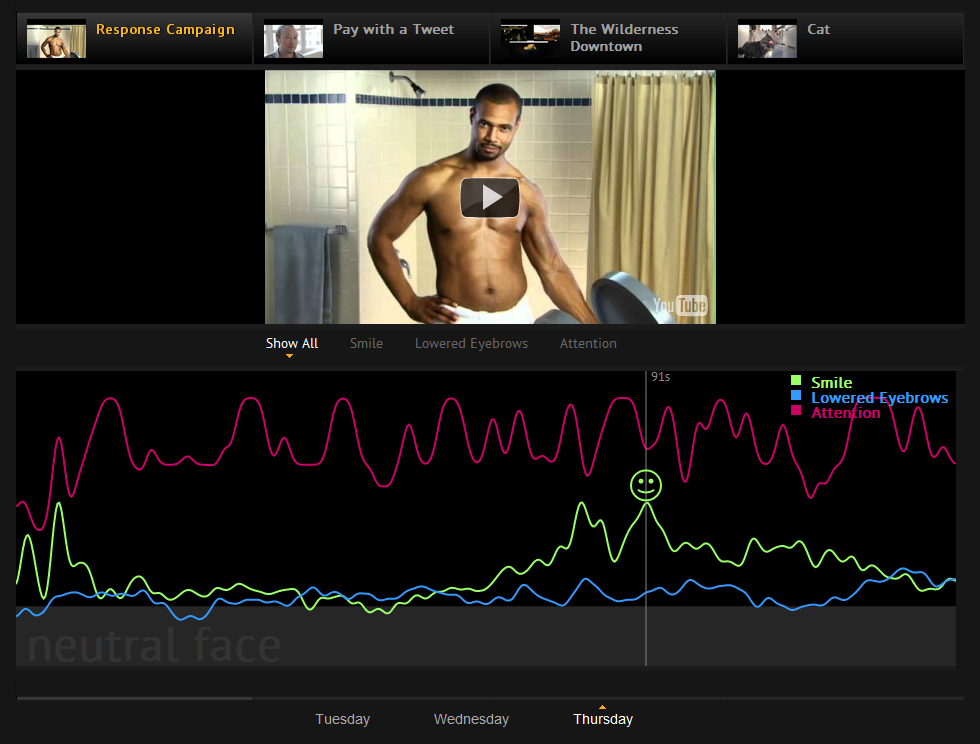There are too many portmanteau words created each month for me to keep track of all of them. Especially from my own paranoid studies with a scientific background… “neuroanatomy”, “sociolinguistics”… witnesses of our evolution and the boom of all sorts of disciplines. My new word today is “neuromarketing”, which comes to reinforce my “sophisticated” technical vocabulary. Scientific developments such as this one should come to satisfy our most basic needs.

Welcome to the marvelous world of neuromarketing where everything is intimately related (or not) with consumption as a primitive act.
This lovely discipline studies the cognitive effects of marketing in order to make communication a more efficient tool. Basically the rise of neuroscience which has allowed us to map, decode and study our brains in detail over the last few decades has finally been swallowed by marketing itself, probably the most omnivore discipline. We know thanks to neuroscience how the different areas of our brain work, which reactions take place in different situations and what behaviors are related to which parts of the grey matter. The magnetic resonance imaging and other scan techniques are increasingly used nowadays to continue the analysis of such fascinating organ.
But how does marketing come to befriend these tissue studies? You know how marketing pundits have their eyes on pretty much every new emerging technology, discovery or discipline… anything could become of interest. Could there be anything more beneficial for them than deeply understanding how our brains work when purchasing something? How do our small neurons wriggle when watching an ad or buying a well-known soft drink?
(Joshua Teo speaking @ TEDxSingapore last year)
These big doubts have fascinated product specialist who’ve decided to bring neuromarketing specialized psychiatrists into their teams. When you are capable of understanding how the brain processes branded messages, which behaviors he endorses when watching campaigns and the generated emotions when buying a cola you’ll have a great number of unstoppable tools to make your campaigns even more striking. This is not the first time however that marketing absorbs another discipline for its own needs. A whole section of modern communication was wolfed down in the 50s & 60s bringing a large number of behaviorism theories for marketeers to play with; especially those related with brand and product awareness.
(NMKTG has become so essential to marketeers that it even has it’s own Cannes Lion award)
As you’ve probably guessed the pioneers in this field are the marketing kings Coca Cola & Pepsi. Their rivalry is legendary in every single way: tv spots, school & project sponsoring… and we shall also praise their neuromarketing competitive efforts. McCLure carried out a product tasting comparison in 2004 with 2 tasting sessions: a blind one (both doses of soda presented anonymously), and a second one explicitly designating the Coca-Cola drink.
During the first test the MIR registered an activation of brain areas linked with pleasure & taste while the subjects showed no particular preference for any of the drinks. During the second one the same brain areas where accompanied by those of memory (hippocampus, ventromedial prefrontal cortex …) demonstrating how consumers are more influenced by their memory of the brand than they are by the taste of the product.

Even if you think you’ve developed a certain level of ad-immunity and are capable of controlling your emotional intelligence (which absolutely never interferes with your rational choices) neuromarketing may well destabilize you. The prefrontal cortex is home to behavior regulation, more precisely, it allows you to connect the information that will lead to behaviour development…. so when you make a choice or act this cortex is responsible for such. It is connected to the emotional loop however… making decisions and behaviors dependent on our emotions. And in this aspect neuromarketing has nailed it, current ad campaigns are particularly offensive on the emotional aspect & attributes of the product, a way to improve the spot impact and the ROI that goes with it.
Let’s add a bit of perspective. Just as interesting as the neuromarketinian approach (if I’m allowed to use this term) is the criticism it has raised mainly on the ethical side. Is it moral to use neuroscience on behalf of consumption?
Consumers may be aware that neuromarketing exists and that some corporations invest large sums every year on improving their com. campaigns based on these research works; but hardly anyone knows how these studies are carried out.
(skittle’s interactive campaign also won a Cyber Lion this year)
It may be true that scientific rigor obliges companies to inform these subjects on the research processes, a standard that becomes even more strict when related to applications that could affect a large amount of people. But the influence these mass marketing campaigns is too important to neglect its direct or perverse effects = Analyze to design an even more addictive way is somehow controversial and the scientific community should be focused on analising & designing to improve knowledge and living standards not the opposite. One last question to ask neuromarketing experts would be… is harder, better, faster, stronger consumerism a synonym of a better life?
Please don’t allow me to finish arguing in such simplistic way. A tiny part of modern research techniques maybe focused on designing the perfectly decerebrated purchasing process but psychology is much more than that and thank-god many other disciplines exist…. from tracking autism, to battling schizophrenia or depression. It’s always good to add a moral reminder each time there’s a new discovery or research initiative but let’s not forget that neuromarketing as a tool is simply neutral. Then if you want to use it for………….. that’s another discussion.
(photos by SMI Eye Tracking & Affectiva)
















